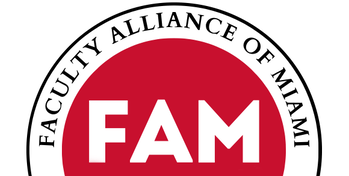At the Board of Trustees meeting on December 13, English professor and FAM faculty organizer Cathy Wagner questioned how Miami leadership can claim responsible stewardship of Miami’s resources while using inaccurate data and assumptions to make decisions.
For more on FAM’s direct action at the Board meeting and links to other speeches members made to the Board, click here.

Chair Schell and Board of Trustees, my name is Cathy Wagner, professor of English, and I’m here to talk about stewardship. The university has said in public messaging that “as a public institution, it has an obligation to be a responsible steward of public funds and student tuition.” I agree, and I have questions — because we can all agree that good stewardship and good solutions are based on good data and info.
- Was it good stewardship of public funds to pay Bain & Company $7.29 million? How much employee time is being spent in correcting unreliable data and analyses rooted in mistaken assumptions?
- Is it effective stewardship to use a figure of 800 under-enrolled courses to call for curriculum and workload changes when a reliable analysis shows that the true number is only about a quarter of that?
- Is it good stewardship of public funds to give Miami’s president a larger bonus [p. 4] than a Miami librarian makes in a year?
- Is it good stewardship to construct budgets that starve our core academic mission of funds? Year on year, we hear of deficits in the Academic Affairs budget that require cuts. But year on year, when we move from budget to actuals, we find that we’re running large surpluses and the “deficit” has vanished.
Deficits in Academic Affairs serve as nontransparent savings accounts, allowing for allocation decisions to be sheltered from scrutiny while faculty, librarians, deans and chairs are kept busy and fearful. We’re told Academic Affairs is the problem, when actually it’s the goose that laid the golden egg.
The proof: yesterday’s Finance and Audit Committee agenda reports that Miami University has “assessed its financial resources across the enterprise” and discovered $150M it has no immediate need for and can invest [p. 247].
According to that agenda, the reason Miami has $150 million lying around is “prudent fiscal management” [p. 250]. But the truth is that management, however prudent and clever, cannot generate revenue. While some of that money came from investment income, the vast majority was generated by faculty labor. That pile of money is evidence of the health of our academic enterprise and evidence of faculty’s value. - Since faculty are the engine that generates such value for the institution, wouldn’t it be excellent stewardship to recognize that with a cost-of-living raise?


Leave a Reply